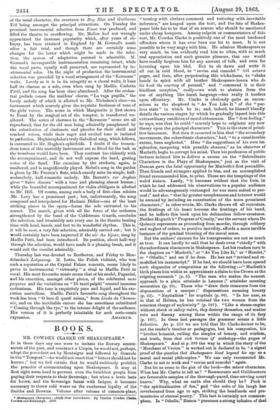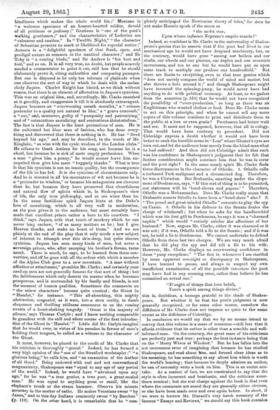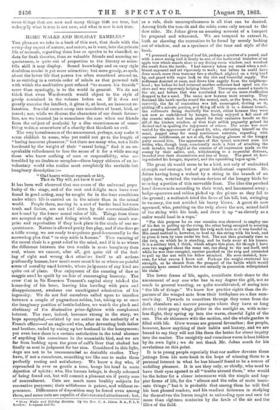BOOKS.
MR. COWDEN CLARKE ON SHAKESPEARE.* Iv in these days any one were to imitate the literary amuse- ments of the past, and construct a Utopia, he would not, perhaps, adopt the precedent set by Montaigne and followed by Gonzalo in the " Tempest,"—he would not enact that "letters should not be known ;" but we feel certain that he would ruthlessly prohibit the practice of commentating upon Shakespeare. It may at first sight seem hard to prevent even the humblest people from paying their respects to their Sovereign ; but when a levee lasts for hours, and the Sovereign faints with fatigue, it becomes necessary to throw cold water on the exuberant loyalty of the Smiths and Browns. Volume after volume of common-place,
* Stakupeare Charaeters ; Mita!, those Subordinate. By Charles Cowden Clash*.
London and Edinburgh. 1863.
"teasing with obvious comment and torturing with inevitable inference," are heaped upon the text, and the fate of Shakes- peare bids fair to be that of an actress who should be smothered under cheap bouquets. Among culprits or commentators of this sort, Mr. Cowden Clarke is positively one of the most hardened offenders whom it has ever been our lot to meet. It is not possible to be very angry with him. He admires Shakespeare so very much, he has evidently read him so often, with so much real appreciation and such genuine pleasure, that one would have readily forgiven him for any amount of talk, and even for lecturing upon his idol. But to sit down and write it all out in cold blood, to "revise and remodel" 521 octavo pages, and then, after perpetrating this wickedness, to "shake hands in spirit with all brother Shakespeare-lovers who do his book the courtesy of perusal," and "commend it to their kindliest reception," really—we wish to abstain from the use of anything like harsh language —but really it borders upon effrontery. Mr. Clarke is obviously quite as uncon- scious 'as the shepherd in "As You Like It" of the "par- lous state" in which he is ; and, indeed, he himself blandly details the various stages by which he gradually lapsed into this extraordinary condition of moral obtuseness. His "first feeling." he says, was that he could "scarcely hope to originate any new theory upon the principal characters? This is the state of primi- tive innocence. But then it occurred to him that "the secondary movements, the subordinate characters," had, "to a considerable extent, been neglected." Here "the suggestions of his own im- agination, tampering with possible chances," as he observes of Macbeth, begin to corrupt his mind. Then his profession of public lecturer induced him to deliver a course on the "Subordinate Characters in the Plays of Shakespeare," just as the visit of Duncan gave the fatal opportunity for Macbeth's first peccadillo. Then friends and strangers applied to him, and an accomplished friend recommended him, to print. These are the temptings of the weird sisters. Lastly, "it becomes evident that the form in which he had addressed his observations to a popular audience would be advantageously exchanged for one more suited to per- usal ;" and also, " that far greater completeness and interest would be secured by including an examination of the more prominent characters ;" in other words, Mr. Clarke throws off all restraints, the firstlings of his heart become the firstlings of his hand, and he inflicts this book upon his defenceless fellow-creatures. Neither Hogarth's " Progress of Cruel ty,"nor the servant whom De Quincey represents as proceeding from murder, through robbery and neglect of orders, to positive incivility, affords a more terrible instance of the gradual blunting of the moral sense.
But the authors' excuses for his transgression are not so much as true. It can hardly be said that he deals even " chiefly " with the subordinate characters in Shakespeare. Let his readers turn to the chapters on "Macbeth," or "As You Like It," or "Hamlet," or "Othello," and see if he does. He has not "revised and re- modelled his manuscript." If he had, we should have been spared such elegancies of composition as the following :—" Macbeth's birth places him within as approximate a claim to the Crown as the reigning monarch" (p. 5). "The man who makes the nearest approach to a plain attainder is Lennox ;" attainder meaning accusation (p. 20). Those who "draw their resources from the dispensations of a usurper ;" dispensations meaning bounty (p. 22). " Nuptialities " for nuptials (p. 96). "In her case, as in that of Helena, he has retained the two women from the remotest charge of unfeminity" (p. 197). "Like a steam-engine without cheek or safety-valve, they destroy themselves, and scatter ruin and dismay among those within the range of its fury (p. 167). In these last passages the grammar seems a little defective. At p. 215 we are told that Mr. Clarke desires to be, not the reader's teacher or pedagogue, but his companion, his "brother botanist, culling the simples of beauty, and wisdom, and truth, from that rich terrene of anthology—the pages of Shakespeare." And at p. 389 the way in which the story of the "Merchant of Venice" is worked out is declared to be "a signal proof of the question that Shakespeare lived beyond his age as a moral and social philosopher." We can only recommend Mr. Clarke to set to work and "revise and remodel" again.
But let us come to the gist of the book—the minor characters. What has Mr. Clarke to tell us ? " Rosencrantz and Guildenstern are favourable samples of the thorough-paced, time-serving court knave." Why, what on earth else should they be ? Puck is "the spiritualization of fun," and "the echo of his laugh has reverberated from age to age, striking the headlands and pro- montories of eternal poetry." This last is certainly not common- place. In "Othello," Bianca "possesses a strong infusion of that
kindliness which makes the whole world kin ;" Montano is '4a welcome specimen of an honest-hearted soldier, devoid
of all pettiness or jealousy ;" Gratiano is "one of the poet's walking gentlemen ;" and the characteristics of Lodovico are "calmness and caution." In "Twelfth Night," "the character of Sebastian presents no mark or likelihood for especial notice ;" Antonio is a "delightful specimen of that frank, open, and prodigal nature so common in the nautical character ;" and Sir
Toby is "a roaring blade," and Sir Andrew is "his butt and tool," and so on. It is all very true, no doubt, but people scarcely needed a commentator to point it out, still less that he should elaborately prove it, citing authorities and comparing passages. But one is disposed to be only too tolerant of platitude when one observes the sort of way in which he deals with the melan- choly Jaques. Charles Knight has hinted, as we think without reason, that there is an element of affectation in Jaques's cynicism. This was an original idea, and, accordingly, Mr. Clarke snatched at it greedily, and exaggerates it till it is absolutely extravagant. -Jaques becomes an "overweening mouth moralist," a " solemn pretender to a quality not natural to him," a " grave coxcomb," "cur," and, moreover, guilty of "pomposity and patronizing," and of "ostentatious moralizing and sententious dictatorialism." The fact is that Jaques is the least pretentious of men. He ia the cultivated but blasé man of fashion, who has done every- thing and discovered that there is nothing in it. He has "lived beyond his age," and may be described, in the words of Mr. Kinglake, "as wise with the cynic wisdom of the London clubs." He refuses to thank Amiens for his song, not because he is a 'churl, but because he is sick of mere empty professions. When a man "gives him a penny," he would sooner leave him un- requited than give him mere "beggarly thanks." What is true is that his cynicism is not an innate quality, but the consequence of the life he has led. It is the cynicism of circumstances only. And he is worsted in all his encounters of wit not because he is a "pretender to wisdom," or because his antagonists are cleverer than he, but because they have preserved that cheerfulness and natural flow of spirits which is, in Shakespeare's view of life, the only true philosophy, and so are wiser than he. In the same fastidious spirit Jaques hints at the Duke's love of moralizing, which is all very well in moderation, as the poet gives it to the audience, hut must certainly have made that excellent prince rather a bore to his courtiers. "I think," says Jaques, with that touch of mockery which he can never long eschew, "of as many matters as he ; but I give Heaven thanks, and make no boast of them." And we see plainly at the end of the play that it only needs a new subject of interest to triumph over this skin-deep, but quite sincere cynicism. Jaques has seen many kinds of men, but never a sovereign prince, who, after usurping his brother's throne, turns monk. There is much, he says, to be learned from these con- vertites, and off he goes with all the ardour with which a member of the Alpine Club goes to a new mountain. "A man without affection or attachment," grumbles Mr. Clarke ; and certainly your used-up men are not generally famous for that sort of thing ; but the faithlessness which only deserts its master when he becomes prosperous, and is surrounded by his family and friends, is not the meanest of human qualities, Sometimes the comments on "the minor characters" become quite comical ; the Ghost in "Hamlet," for instance. "This all-absorbing, this mighty abstraction, congealed, as it were, into a stern reality, in dumb eloquence and thrilling stillness announces to us the coming events of a heart-shaking tragedy. 'Great is the majesty of silence,' says Thomas Carlyle ; and I know nothing comparable in grandeur with the still and silent course of the first introduc- tion of the Ghost in ' Hamlet.' " Little did Mr. Carlyle imagine that he would ever, in virtue of his paradox in favour of men's holding their tongues, be called as a witness to the character of the Ghost.
It must, however, be placed to the credit of Mr. Clarke that his criticism is thoroughly "genial." Indeed, he has formed a very high opinion of the "son of the Stratford woolstapler ;" "a glorious being," he calls him, and "an emanation of the Author of all Good." Being endowed with real and not conventional magnanimity, Shakespeare was "equal to any age of any period of the world." Indeed, he would have "advanced upon any age," for he was "a true genius, a true poet, a great-souled man." He was equal to anything great or small, like the elephant's trunk or the steam hammer. Observe his minute accuracy in the matter of oaths. He makes Venetians swear "by Janus," and to this day Italians commonly swear "by Bacchus" (p. 119). On the other hand, it is remarkable that he "com-
pletely anticipat.ed the Newtonian theory of tides," for does he not make Horatio speak of the moon as "the moist star,
Upon whose influence Neptune's empiie stands?" Indeed, so confident is Mr. Clarke in the universality of Shakes- peare's genius that he asserts that if the poet had lived in our mechanical age he would not have despised machinery, but, on
the contrary, would have gone "among our boilers and our shafts, our wheels and our pinions, our duplex and our eccentric movements, and ten to one but he would have put us upon some track to multiply our produce one hundredfold." But there are limits to everything, even to that true genius which "does not merely compass the world of mind and matter, but also throws a halo around it ;" and though Shakespeare might have invented the spinning-jenny, he would never have had anything to do with political economy. At least, so we gather from the assertion (p. 510) that he would not have recognized
the possibility of "over-production," so long as there was an
Englishman who wanted clothes or food. Does Mr. Clarke mean to act on this principle, and when he cannot sell any more copies of this volume continue to print and distribute them to the public at a loss or even gratis? Purchasers had better wait and see. It must not be supposed, however, that all is eulogy.
That would have been contrary to precedent. Did not Coleridge express a doubt whether it would not have been better to omit the horrible scene in "Lear" where Gloster's eyes are torn out, and let the audience hear merely from the blind man what he had suffered? And then did not Coleridge admit that such was his confidence in Shakespeare's judgment that he felt that further consideration might convince him that he was in error and the poet right? In the same manly spirit Mr. Clarke finds three discrepancies in the character of Othello. 1. Othello calls a turbaned Turk malignant and a circumcised dog. Therefore, he was a Christian. But Brabantio, smarting under the elope- ment of Desdemona, says, "If this sort of thing is to be permitted,
our statesmen will be 'bond-slaves and pagans.'" Therefore,
Othello was a Mohammedan. Does Mr. Clarke really mean that Brabantio asserts Othello to have been a" bond-slave" also ? 2.
"The proud and great-minded Othello" consents to play the spy
on Cassio. 3. Othello in his defence to the Senate denies the charge of witchcraft ; but when be asks for the handkerchief which was his first gift to Desdemona, he says it was a "charmed
napkin" which would "entirely subdue the affections of her husband." Now, argues Mr. Clarke, either it was charmed or it was not ; if it was, Othello told a lie to the Senate ; and if it was
not, he told a lie to Desdemona. We cannot undertake to defend Othello from these last two charges. We are very much afraid that he did play the spy and did tell a fib to his wife. However, Mr. Clarke displays no overweening confidence in these "puny exceptions." "The fact is, whenever I am startled by some apparent oversight or discrepancy in Shakespeare, I have learned to pause, and always to suspect my own insufficient examination of all the possiblb intentions the poet may have had in any seeming error, rather than believe he has committed an actual one."
"If aught of things that hero befall, Touch a spirit among things divine," this is, doubtless, a homage grateful to the shade of Shakes- peare. But whether it be that the poet's judgment is now generally recognized, or for some other reason, somehow the diffidence of 11r. Clarke does not impress us quite to the same extent as the diffidence of Coleridge.
In conclusion we would say that we by no means intend to convey that this volume is a mass of nonsense—still less that it affords evidence that its author is other than a sensible and well- informed man. On the contrary, the great mass of his criticisms are perfectly just and true; perhaps the best instance being that on the "Merry Wives of Windsor." But he has fallen into the not uncommon error of imagining that because he has studied Shakespeare, and read about him, and formed clear ideas as to his meaning, be has something to say about him which is worth the world's hearing ; that because he deeply admires an author, he can of necessity write a book on him. This is an entire mis- take. As a matter of fact, we are constrained to say that the style is often incorrect and bombastic, and the criticism some- times comical ; but the real charge against the book is that even where the comments are sound they are generally either obvious, or else have been made over and over again before. In short, if we were to borrow Mr. Disraeli's very harsh summary of the famous "Essays and Reviews," we should say this book contains
some things that are new and many things that are true, but unhappily what is true is not new, and what is new is not true.
































 Previous page
Previous page